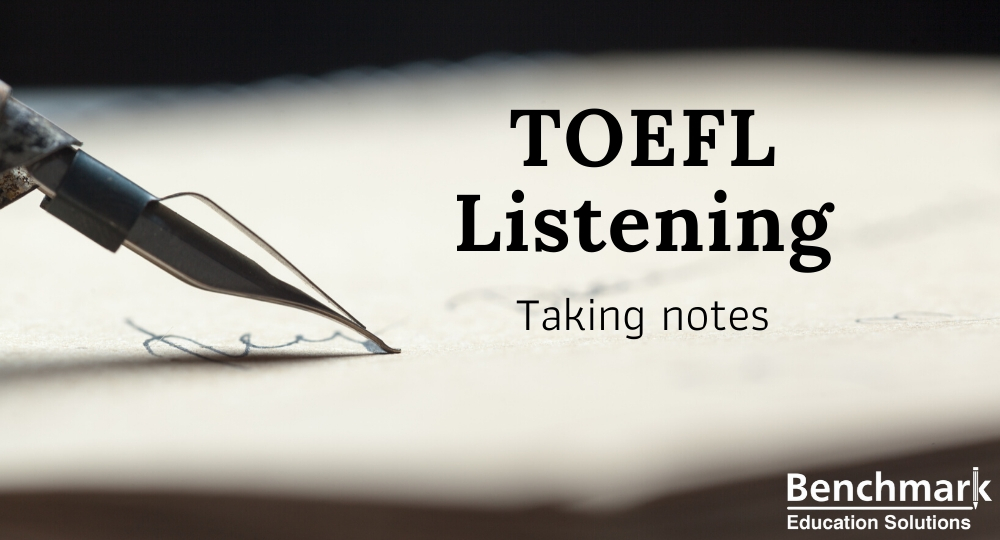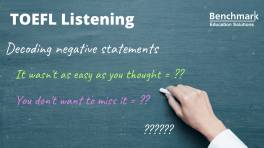
Did you know that one of the most important things you can do to ensure success in the TOEFL listening test is to make notes? It’s true. Note-taking is an incredibly important skill and it can really give you a big boost in terms of remembering and analyzing information.
There is something about making notes with a pen and paper that gives people a mental boost. Scientific studies have shown that this process can help us with memory retention, and it is believed that the simple act of writing something down can give us a better chance of figuring out its meaning.
This is really important for TOEFL listening. Although it may be tempting to just listen and then answer the questions, it is highly recommended that you take some notes. For the above mentioned reasons, it can actually increase your chances of getting the right answers later.
What should you write down?
It is important in note-taking that you don’t write down everything. Unless you have superhuman writing skills, you simply won’t have enough time to do it. Instead, you should pick out key details and write them on your notepaper. You should focus on getting the main point that someone has said, the key details about that main point, and facts that you may not otherwise remember. Things like numbers, names, or places are also quite useful to note down.
You should not bother to write down any “grammar words” like prepositions, articles, or modals (unless they impact the meaning of the sentence such as should vs shouldn’t). These are words that probably don’t contribute greatly to the meaning that you need to remember, and writing them will only waste valuable time.
Let’s say that you hear the following sentence spoken:
- The United Nations issued a statement about global warming.
What would write down as a note about this, assuming you decided it was important?
Perhaps you might write:
- UN statement – glob warm
I have omitted the articles and prepositions from this, as well as a verb that was implied by the key words in the note. However, I have done something else: I have made several abbreviations.
Abbreviations in note-taking
The word “abbreviation” means to make something shorter. For example, above I used a standard abbreviation for the United Nations: UN. You will surely know many of these, such as making the United States of America into “USA” or the United Kingdom into “UK” and so on.
This is easy, but you will also need to get used to making up your own abbreviations, too. In fact, note-taking is a highly personal thing. You don’t need to understand other people’s notes and they don’t need to understand yours. The important thing is that you can:
- Write something down very quickly
- Understand it when you read it later
In my previous example, I wrote “glob warm” as an abbreviation for “global warming.” This might not make any sense to another person, but it would remind me later what I had written, and of course it would take less time to write down. If you are listening to a passage that is all about global warming, then you may want to write “GM” because it’s even quicker, and you are unlikely to forget what it referred to. This is especially true for words that are often repeated.
People are going to have different ideas about this, but as long as it makes sense to you, it is ok. There are, however, some pretty common abbreviations that people around the world use when taking notes. For one thing, when we talk about “governments,” we tend to avoid writing out the whole word because it’s actually quite long. Instead, we usually say “govt.” This is a nice and easy one because there aren’t many similar words. Likewise, it is quite common to write down “ppl” instead of “people.”
What do you think this note means?
- Ppl often critgovtbc corrupt
Well, we already know what “ppl” and “govt” mean, and we have two full words. But what about “crit” and “bc”? “Bc” is often used as an abbreviation for “because” and you could probably assume that “crit” stands for “criticize” or “critical.”
This note could then be translated as:
- People often criticize their governments because of corruption.
There are various possible ways that this might have appeared in the original listening passage, but the important thing is that your personal note-taking would help record this information in your brain. As I said previously, it doesn’t matter whether you could decode someone else’s notes. What is important is that you can understand your own ones.
How to practice abbreviations for TOEFL
There many ways that you can practice your TOEFL listening skills. One thing that you can do is listen to podcasts or documentaries. Of course, this is mostly passive listening, so the important thing is to make it active. You can thus listen to a section and make some notes on it. Then you can go back and see if you can paraphrase the passage from your notes. You will be surprised how well you can do it if you have made good notes.
Let’s say that you listened to a two minute excerpt. It would be extremely difficult to remember everything that was said, but if you took notes, then you would certainly remember the main ideas and be able to reconstruct lots of the passage. You might even practice saying it out loud and seeing how much you were able to repeat with a degree of accuracy.
Choose things that interest you at first because this level of interest will sustain your enthusiasm. After a while, start picking more difficult or abstract topics. You will find that, over time, you develop a personal note-taking style that involves your own unique abbreviations. More importantly, you will get faster and better at writing and remembering things.





